 |
| Call for Writers: Feminist Travel Films |
The Beach
Before Sunset
Best Exotic Marigold Hotel
Y Tu Mama Tambien
The radical notion that women like good movies
 |
| Call for Writers: Feminist Travel Films |
The Beach
 |
| Michonne in The Walking Dead |
Written by Megan Kearns | Warning: spoilers ahead!
So the season 3 finale of The Walking Dead. What can I say? Is there less sexism than last season’s appalling anti-abortion storyline with Lori’s pregnancy? Did the addition of badass Michonne change the gender dynamics?
It’s also interesting to note that the writers changed the sexual assault survivor from a black woman to a white woman. Too often, the media erases the narratives of black women rape and assault survivors, choosing to focus on white women survivors.
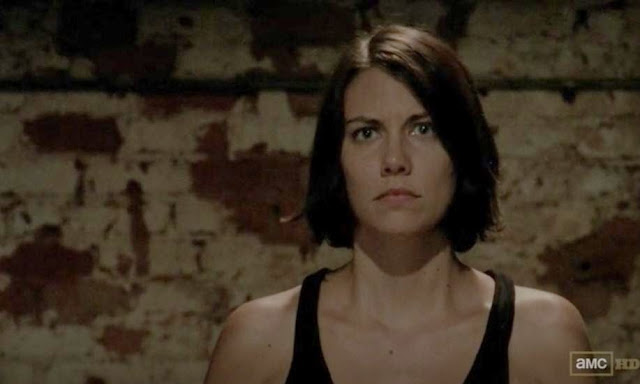 |
| Maggie in The Walking Dead |
 |
| Lori and Carl in The Walking Dead |
“I don’t mean to sound sexist, but as far as women have come over the last 40 years, you don’t really see a lot of women hunters. They’re still in the minority in the military, and there’s not a lot of female construction workers. I hope that’s not taken the wrong way. I think women are as smart, resourceful, and capable in most things as any man could be … but they are generally physically weaker. That’s science.”
Stephanie: So, FemFuture … not to get narcissistic right off the bat, but where do blogs like ours fit into that discussion?
Megan: I don’t think that’s narcissistic at all. I think it’s a pertinent question.
Stephanie: Because funding IS important, but who decides WHO gets funding — the “connected” people? Because that’s certainly what it seems like.
Megan: Very true. But even the “connected” people are often times not funded either.
Stephanie: No one is funded now.
Megan: Or are not funded enough to make it their primary job. Feministing comes to mind.
Stephanie: The FemFuture discussion was about HOW to get funding for bloggers, right?
Megan: It was about the future of online feminism, part of it was funding as well as meeting annually and networking. But yes, a big thrust of it was the argument that online feminists aren’t getting funded and should be.
Stephanie: Right. So … I mean, they really didn’t even mention Shakesville? LOLOLOL
Megan: I KNOW. Ridiculous. How could you ignore Shakesville???? One of the most influential and prolific feminist blogs???
Stephanie: So, the “connected” people are the ones deciding whose blogs are important and who gets funding.
Megan: Shameful. I saw their argument or conversation more as everyone should be funded. BUT by leaving Shakesville out, which as Melissa McEwan states in her post about FemFuture, is not in NYC or DC, it does make it seem that is what is happening, even if not explicitly stated.
Stephanie: Trans blogs, vegan blogs, etc.
Megan: YES!!!!
Stephanie: That report was a fucking shitshow.
Megan: I mean c’mon, ridiculous.
Amber: From what I’ve read, I agree!
Stephanie: It was SO OUT OF TOUCH and that’s what scares me.
Megan: YES!!!
Stephanie: Like, you’re The Leaders of this and you have no fucking idea what’s going on with blogs right now.
Megan: I really, really, really like that a report like this was done. However, and that’s a ginormous however. If you’re going to do it, and discuss how marginal online feminism and feminist blogs are, shouldn’t you strive to be as inclusive as possible? And not perpetuate exclusion??
Amber: I also think that what we’re doing is at the intersection of film and feminism, which doesn’t really fit their precise definition of what feminist online activists are and what we do.
Megan: YES, Amber!!! People don’t often think of feminism and the arts as part of the “feminist online community.”
Amber: Same as what Steph said, with regard to vegan feminists, et al.
Megan: Well, as a vegan feminist, I can tell you there aren’t a whole hell of a lot of vegan feminist blogs but that’s beside the point.
Stephanie: It’s true, and it’s funny … because (not to be ridic) but I think what we’re doing is important because it’s challenging media portrayals … and media portrayals are what feed these fucking stereotypes about people/women/etc.
Megan: They should be reaching out to ALL kinds of feminist blogs. Omg you are so NOT being ridiculous AT ALL. I agree. Media starts shaping our lives inculcating us into sexism and patriarchy at an early age.
Stephanie: It’s like, how is this NOT where we start? Especially with kids (which is why I liked the animated films week so much).
Megan: Yes, yes, yes.
Stephanie: Maybe they felt like they already involved Women’s Media Center and Jenn Pozner’s media site.
Megan: And as we age, media shapes how we view the news, and what news we see and hear.
Amber: As someone who does not, and has not ever, lived in a major media center, the clubbishness and exclusiveness of the fem community has always angered me.
Megan: If you’re going to write about how online feminism needs to be more inclusive and funded and not treated as a fringe thing, then maybe you should be, oh I don’t know, INCLUSIVE.
Amber: YES.
Megan: Amber, I live close to NYC and still feel that way too.
Amber: There’s such a contradiction in the very premise of it: we’re diverse and living all over the place, yet only the NYC fems (no offense, NYC) get to determine the future???
Megan: I mean, the NYC feminist community, the people who are a part of it are super nice and friendly and welcoming. But it can still feel cliquish.
Amber: Shouldn’t this have been a big organized teleconference? THAT would have been historic.
Megan: I had a very brief convo about this on Twitter. About how all feminist bloggers live in NYC. When I replied that I don’t, they were like yeah but you’re in the Northeast. True but trust me, Boston and NYC are not the same.
Stephanie: So read this….this is from the new FAQ from FemFuture report/site: “We chose people whose work we knew about and respected who represented a diverse range of perspectives and kinds of work. Our hope was to see if in-person conversation and convening could add something to the conversation that already existed online. One particular regret was, we weren’t able to bring much geographic diversity to the convening—which we wanted to be in person and intimate. While so many of us originally come from different areas of the country (and world), and have built online communities of readers, followers and colleagues worldwide, the majority of the convening attendees currently live on the east coast. This was a gap we acknowledge and hope will be filled in follow up conversations—either online or in person—and welcome ideas.”
Megan: Also, I checked on the geographical location of most of the speakers…They don’t just live on the East Coast…They live in NYC or NJ.
Stephanie: Bwwahahhaahah NYC/NJ equals all of the East Coast now!
Megan: I KNOW!!!! I mean, what the fuck. Just talking about cities, fuck you, Boston, DC, Atlanta, Miami, Baltimore, Charleston. Bleh.
Stephanie: I love how I’m getting even MORE pissed.
Megan: LOL right????
Stephanie: Also, they apparently didn’t even CONSULT with people who don’t live there (like Liss) … and it’s funny because the Flyover Feminism blog they started together is important in addressing that not all feminists live in these metro areas.
Megan: I KNOW!!!!
Stephanie: ALSO, I fucking live in NYC, and I don’t have a big networking personality, so fuck that.
Megan: You were exactly who I was thinking of!!!
Stephanie: Our bloggers live ALL OVER (the country/world LOL) so fuck that too.
Megan: So it’s exclusionary to you too despite your physical proximity.
Stephanie: Exactly.
Megan: EXACTLY.
Amber: YES. And doesn’t that create a more diverse perspective? Our bloggers being everywhere, I mean.
Stephanie: I mean, like 5 people came to our party, and we’ve been around for 5 years in NYC.
Megan: Yes to both of you! Did either of you read Flavia Dzodan’s reply US Centrism and Inhabiting a Non-Space in FemFuture? So, so good.
Amber: I have Flavia’s piece open now.
Megan: Basically she talks about living in Europe and how she doesn’t fit the U.S. feminism mold.
Stephanie: “I sincerely have no thoughts because I don’t belong in this.”
Megan: Yep. And THIS! “To call what is going on in an Anglo centric environment ‘online feminism’ is to cast me (and millions like me) away from the umbrella. We live elsewhere.”
Stephanie: Love.
Amber: “My resistance ends up being a double bind: I need to resist the policies, racism, discrimination, etc of a State that considers those like me disposable and I need to resist the absorption of the ‘Mother Ship’ that owns the discourses around which feminist issues matter the most.”
Megan: Mmhmm
Stephanie: I wish I knew how to express my emotions about this but I don’t wanna be all “they didn’t incluuuuude uuuuuus” LOL
Megan: LOL I know. And part of me feels like we should band together. But a larger part of me is like fuck that noise. There’s nothing wrong with being critical of our own community, even a community that we’re kinda sorta not even really a part of because it doesn’t speak to us, include us or address us.
Amber: They’re not speaking to us or for us, and maybe that’s okay?
Stephanie: YES. No, YES to Megan, not Amber. LOL
Amber: I mean, it pisses me off.
Megan: Zerlina Maxwell tweeted that FemFuture is not a zero sum end game. It’s a starting point. Amber, I hear you but I don’t think it is okay.
Stephanie: It is absolutely not okay … but maybe people’s anger/disappointment about the whole thing could change it.
Megan: I think if you’re talking about “feminism” or “online feminism,” then you need to be as inclusive and diverse as possible.
Stephanie: A real inclusive way to handle it would’ve been to tweet or blog or something to get the word out and have bloggers send in their responses about what the blogosphere is like for them.
Megan: YES!!!
Stephanie: I mean fucking DUH.
Megan: LOL
Stephanie: You get together in a closed room like a bunch of fucking Republicans and try to discuss some shit you know nothing about?
Megan: Did either of you see MAKERS, that documentary?
Stephanie: Nope.
Megan: Okay so the documentary is really good, chronicling the history of the women’s movement and feminism in the U.S. BUT…
Stephanie: It’s like, bloggers are already discouraged. What isn’t helping is you getting up there with your very successful blogs and being all “how do we get funding for ourselves”? LOL. Sorry, go ahead …
Megan: …it leaves only 5 or 10 mins for feminism in the past 10 years and doesn’t even fucking talk about online feminism!!! This pissed off a shitload of people on Twitter because duh. We were written out of this documentary’s history of feminism. But now it feels like that’s exactly what’s happening here. Bitch Magazine has a compilation of people’s responses to FemFuture. And Feministe does too.
Amber: I’ve been much less engaged in the overall FemFuture convo, and I’m honestly on the fence about my anger. On one hand, RAGE, you know? But on the other, this is just more of the same. It’s anti-feminist to create this online feminist hierarchy. But that’s what’s been happening for years, and that’s what FemFuture is continuing. I’ve never wanted to be part of the Professional Feminist Club, because that entire fucking notion is anti-feminist. What Steph said about them acting like a bunch of fucking Republicans is true.
Megan: Yes, yes to all of this. I’m not even sure they realize what they’re doing. Which is shitty. You need to recognize and check your privilege at the door. And living in NYC and having a huge feminist blog or backing organization gives you privilege. It kinda reminds me of the arguments I’ve heard when people critique anti-choice laws in the South or Midwest…”Why don’t they just leave?” Um, fuck you. Who are you to tell someone to leave their home??? But I digress.
Amber: No, it’s all the same. Not a digression.
Megan: Thank you. And true, it stems from the same argument.
Amber: I grew up in the Midwest and live in the South. Shouldn’t FemFuture be reaching out, not to ME, Amber, but to people/orgs/blogs who are slogging through in hostile areas? Rhetorical Q, duh.
Megan: YES. I mean to not reach out to Shakesville or Flyover Feminism, bare minimum, is just shameful.
Amber: Totally.
Megan: I keep saying or rather writing shameful because it is. I mean I know they (Courtney Martin and Vanessa Valenti — both of whom I respect) know about them because Feministing did a piece on Flyover Feminism. And um hello, google??? But I know what you mean about feeling torn. I do too. I feel like we’re not supposed to complain or critique because women and feminists get torn down all the time. But this is seriously wrong. Just thinking about urban areas for a moment, I also don’t like the argument that all urban areas are the same. Because living in Boston, which is only 4 hours away from NYC, has different challenges. For example, for our Bowl-a-thon to raise money for abortion funds, Boston has to do a Triathlon instead of karaoke and Wii Bowling because no bowling alley will host us.
Amber: I remember us chatting about that a while back.
Megan: Yeah, it just bugs me.
Amber: It bugs me, too.
Megan: It’s like I adore NYC. Love, love, love. But the sun doesn’t rise and set only on NYC. What else should we discuss about FemFuture? How do we move forward??
Amber: Well, that’s the real question. We could chat all day about the exclusionary aspects of it. But I still can’t get over the fundamental flaw of the “report.” And the marginalization of pop culture blogs as an “entry point.” We’re doing important, challenging work. Not just Bitch Flicks. Taking culture to task is a central issue.
Megan: YES!!!! It infuriates me how people see pop culture, media and art criticism as fluffy entertainment. It’s not. That’s why it’s such crucial work, because people don’t recognize and appreciate its insidious power. But are there other aspects of the conversation or report that bother you that we haven’t discussed?
Stephanie: Just jumping in on that last comment — um, yeah! If people saw abortion depicted in a humanizing way on their fucking TV shows (which people increasingly watch more and more), then our entire political discourse around the subject would CHANGE.
Megan: EXACTLY.
Stephanie: Talking about political discourse without talking about media representations is completely BACKWARDS in 2013.
Megan: Yes, I don’t know how you can divorce the two.
Stephanie: Our society is run by media devices.
Megan: Yes, advertising, media outlets, film studios….everything. What else do we want to say? What are the solutions?
Amber: Treat it like any other media we critique. Take the authors to task for their exclusiveness.
Stephanie: It might be a better use of our time to discuss writing a new “ABOUT” manifesto for Bitch Flicks and tie the FemFuture thing into it. Like, why is BF important…
Amber: LOVE!
Megan: That’s a great idea!
Stephanie: …and make people fucking understand WHY it’s important, because even some feminists seem unclear on that.
Megan: Some…seems like almost all!
Stephanie: I was working on something like it for a while, behind the scenes. Here’s an excerpt: “That’s both the biggest challenge and the greatest opportunity of blogging about film and television from a feminist perspective—learning to understand how the images we’re fed by the media pretend to reflect back the current cultural climate in an effort to maintain it. And what the predominantly white, patriarchal, heteronormative industry insiders want to maintain is a white, patriarchal, heteronormative status quo.”
Megan: That quote is AWESOME. That quote meaning your quote 
Stephanie: Haha! Thx. Well, let’s start a document and add some stuff to it. We need a new manifesto!
Megan: Sounds great! Anything else we want to say about it?
Stephanie: “Because, more than anything, we believe the blind and uncritical consumption of media portrayals of women contributes to furthering women’s equality in all areas of life. And the absolute most challenging aspect of blogging about the portrayal of women in film and television is finding a way to make those connections, to reinforce the fact that watching a TV show, for instance, in which a woman is violently beaten onscreen—for voyeuristic, entertainment purposes only and without critical commentary—helps to desensitize us and normalize violence against women.” That’s another section [of the BF manifesto].
Megan: YES, love!
Stephanie: I don’t want a group of elite privileged feminists speaking for me. It’s the same set-up that feminism tries to work AGAINST. So why are we recreating it? We’re supposed to be looking for new ways of doing things. It reminds me of all the Occupy Wall Street in-fighting … the people with the loudest voices (usually dudes), with the most confidence, automatically took over and spoke for everyone. I’m glad FemFuture is having the conversation, but they should’ve asked under-the-radar bloggers to contribute and, you know, Shakesville. LMAO.
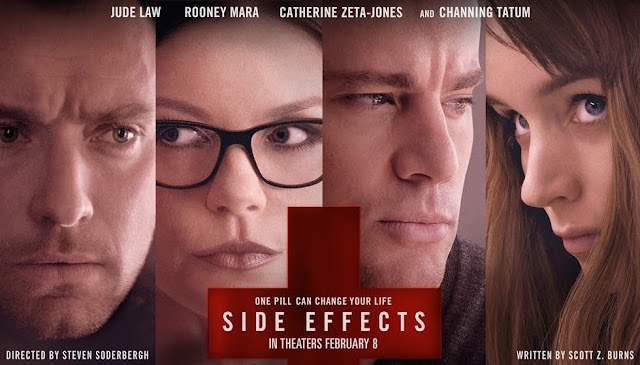 |
| Movie poster for Side Effects |
| Hi |
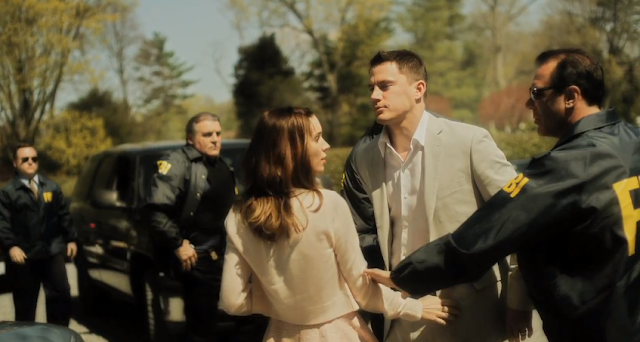 |
| Oh no, Martin, what have you done?! |
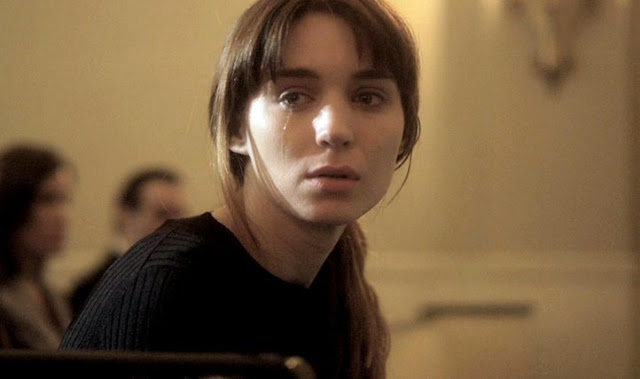 |
| SINGLE TEAR |
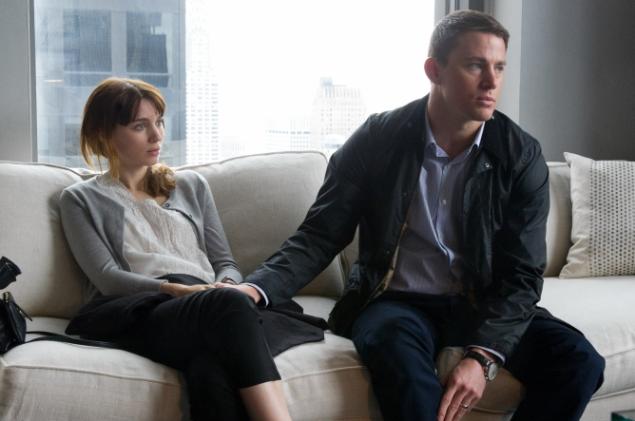 |
| Rich White Dude being all sympathetic and nice |
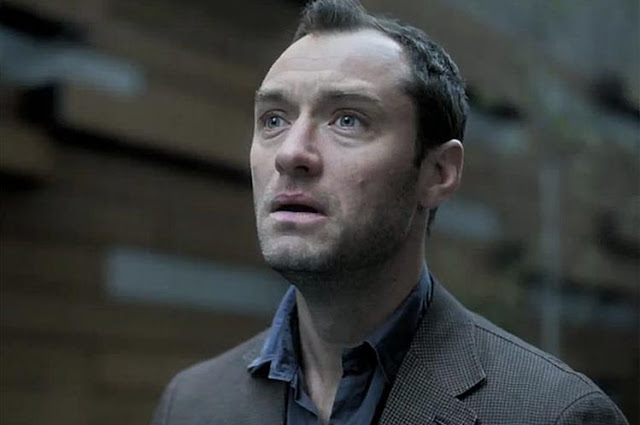 |
| Why are they doing this to Jude Law?! |
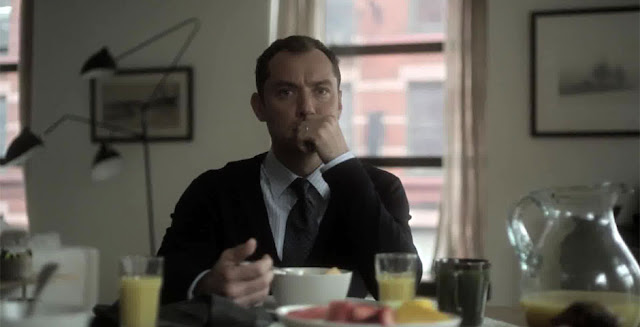 |
| Dr. Banks in the process of unraveling the tricky scheme |
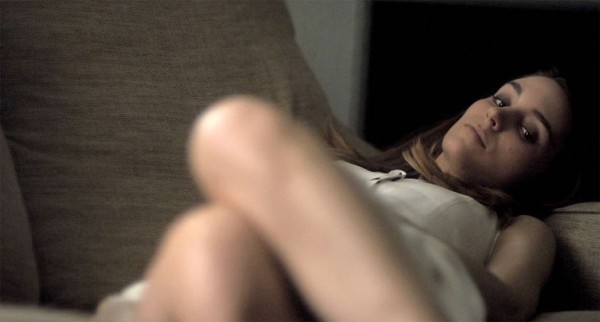 |
| Emily seducing Dr. Seibert because … ? |
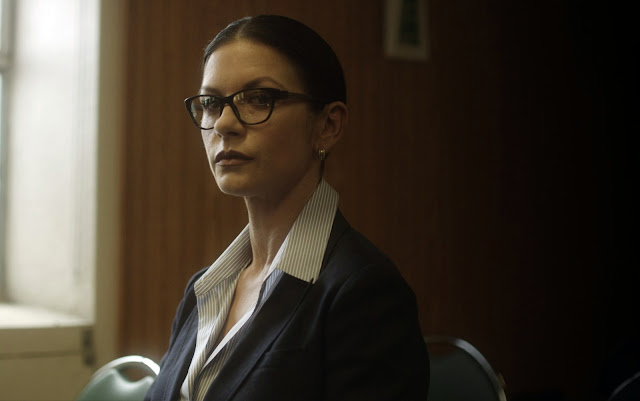 |
| Catherine Zeta-Jones as The Evil Dr. Siebert |
 |
| Dr. Banks knows what’s up. Finally. |
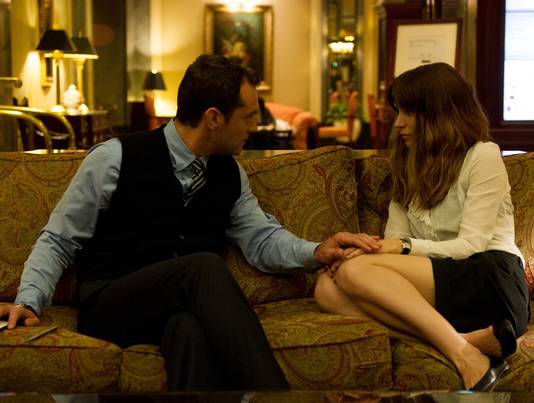 |
| Okay, maybe THIS was a questionable decision, Dr. Banks |
A man named Tommy Bronson reunites with his wife after her five-year stint in prison for insider trading. He becomes depressed and attempts suicide; after all, his wife lost their life savings and forced him to move into a small apartment where he struggled to make ends meet. He begins seeing a psychiatrist—Dr. Sheila Nori—after his first suicide attempt, and Dr. Nori agrees to see him as an outpatient, even though he’s clearly a danger to himself and possibly others. She puts him on an experimental new drug that causes Tommy to sleepwalk. He mentions it to Dr. Nori who immediately says, “You should stop taking the drug.” When he refuses—because his sex life is so much better now!—Dr. Nori drops the subject. Little does Dr. Nori know that Tommy is planning to revenge-murder his wife in a Sleepwalking While Stabbing Event.
 |
| Hi |
Dr. Nori stands by Tommy after the murder, but soon, Dr. Nori’s life starts to crumble. Her medical practice loses business; her colleagues question her ethics; her boyfriend-husband leaves her and takes the kid, too. She sits in her apartment alone, drinking Rolling Rock in the dark. Eventually, she puts some clues together and discovers that Tommy and his past psychiatrist, Dr. John Lerner, had planned the whole thing! And also, they’re lovers! She finds a way to ruin both their lives by having Tommy seduce John in the hopes that John will spill the beans because—get this—Tommy is wearing a wire! They get jail time and/or life in an asylum. Tommy and John fucked with the wrong shrink. (That’s the tagline.)
Psy’s surprising viral rise to the top of every musical chart in the world marks a huge moment for Korean culture; in a country often overshadowed by the magnitude of China and the familiarity of Japan (and even its crazy northern neighbor, North Korea), Psy has become the first truly international Korean symbol, an ironic fact considering that his music is not a standard representation of K-pop (click here and here if you would like to see what K-pop normally looks like).
 |
| Still from Psy’s latest music video, “Gentleman” |
However, perhaps Psy’s overwhelming success might need to be tempered a bit, especially in our enthusiasm for his newest video, “Gentleman.”
Korea is, for the most part, a very conservative culture, one where, despite some very short shorts, most female pop stars remain much more covered in comparison with their American contemporaries. Therefore, I was a bit shocked when halfway through the video, K-pop star and lead female in the video, Ga In from “Brown-Eyed Girls,” sucks on a hot dog with cream bubbling out over the edges in one of the most blatant visual representations of oral sex I’ve seen in a while. Oddly enough, KBS, the national broadcasting network in Korea, even banned the video, though not for this scene; rather, the video was banned because he destroys public property.
 |
| Psy’s music video “Gentleman” and K-pop star, Ga In |
And then I read an English translation of the lyrics: Nope, he’s not making that commentary.
Hey there
If I’m going to introduce myself
I’m a cool guy with courage, spirit and craziness
What you wanna hear, what you wanna do is me
Damn! Girl! You so freakin sexy!
[lengthy chorus where the following line repeats]
I’m a, ah I’m a
I’m a mother father gentleman
I don’t know if you know why it needs to be smooth
I don’t know if you know why it needs to be sexy
I don’t know if you know darling, hurry and come be crazy
I don’t know if you know, it’s crazy, crazy, hurry up
Hey there
Your head, waist, legs, calves
Good! Feeling feeling? Good! It’s soft
I’ll make you gasp and I’ll make you scream
Damn! Girl! I’m a party mafia!
Gonna make you sweat.
Gonna make you wet
You know who I am Wet PSY
Gonna make you sweat.
Gonna make you wet.
You know who I am
Wet PSY! Wet PSY! Wet PSY! Wet PSY! PSY! PSY! PSY!
Ah I’m a mother father gentleman
I’m a, ah I’m a
I’m a mother father gentleman
I’m a, ah I’m a, I’m a mother father gentleman
Mother father gentleman
Mother father gentleman
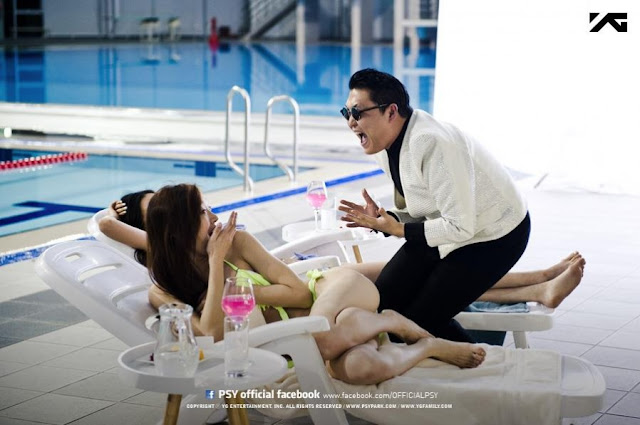 |
| Still from Psy’s latest video, “Gentleman” |
There are problematic performers and songs running around on the Internet every single day, and I usually try not to support those entertainers. After this video, I don’t think I want to support Psy anymore either, cause Psy, you’re just not all that.
What do you think? Is “Gentleman” funny and forward-thinking satire? Or irony taken too far?
Also, I’m not linking to the music video in this article because I just can’t stand to hear the song one more time.
 |
| Bart Simpson appreciating some gay culture |
 |
| Heel, toe, heel, toe… |
 |
| “Fresh!” |
 |
| “Put on this fuschiatard! You are a fairy.” |
 |
| “Sisters doin’ it for themselves!” |
 |
| Bart Simpson appreciating some gay culture |
 |
| Heel, toe, heel, toe… |
 |
| “Fresh!” |
 |
| “Put on this fuschiatard! You are a fairy.” |
 |
| “Sisters doin’ it for themselves!” |
 |
| Spaceship! *starts salivating* |
 |
| Seriously, read the book. |
 |
| Chuck Norris vs Communism |
| Mara Adina, producer of Chuck Norris vs. Communism |
 |
| Screen shot from Chuck Norris vs. Communism |
Did you miss these popular posts on Bitch Flicks? If so, here’s your chance to catch up.
“Stoker: The Creepiest Coming-of-Age Tale I’ve Ever Seen” by Stephanie Rogers
“Shut Up and Sing: The Dixie Chicks Controversy Ten Years Later” by Kerri French
“Clueless: Way Existential” by Robin Hitchcock
“Female Empowerment, a Critique of Patriarchy … Is Crouching Tiger, Hidden Dragon the Most Feminist Action Film Ever?” by Megan Kearns
“Gigli and the Male Fantasy of the Lesbian Turned Straight” by Amanda Rodriguez
“So, Is There Racial Bias on The Good Wife?” by Melanie Wanga
“Oz the Great and Powerful Rekindles the Notion That Women Are Wicked” by Natalie Wilson
“Red, Blue, and Giallo: Dario Argento’s Suspiria“ by Max Thornton
“Feminist Blogger Twisty Faster and Advanced Patriarchy Blaming” by Amanda Rodriguez
“Sexism in Three of Bollywood’s Most Popular Films” by Katherine Filaseta
 |
| Children of Men (2006) |
The “Plague” of Infertility in Alfonso Cuarón’s Children of Men by Carleen Tibbetts
Women can’t get pregnant anymore and nobody knows why. This the central lamentation in Alfonso Cuaron’s 2006 dystopian film Children of Men, based on P.D. James’s novel. Set in England in the year 2027, this is the story of the human race entering its final phase. Cuaron brings us into Orwellian territory in which nations worldwide have fallen as a result of war, disease, and famine. Britain remains a sort of lucrative last bastion in these end times and people across the globe are scrambling to get in.
 |
| Sarah from Inside (2007) |
Inside: French Pregnant Body Horror at Its Finest by Deirdre Crimmins
Horror films have a unique way of showcasing exactly what we fear, but they often do so in a subtle way. While is it goes without saying that ax-wielding maniacs are to be feared, these films often slyly expose the issues that our society is too shy to deal with head on. In the 2007 French horror film Inside (directed by Alexandre Bustillo and Julien Maury), fertility, reproduction, and infant loss are dealt with in a refreshingly direct and uncompromisingly bloody outcome, with no room for subtlety.
 |
| Robin in How I Met Your Mother |
How I Met Your Mother: One of the Few TV Shows to Explore a Childfree Life for Women by Megan Kearns
HIMYM suffers many gender problems. Yes, it infuriated me Lily received so much backlash when she went to LA to pursue her dream of an art career. Almost everything Barney says or does – his sexist stereotypes, objectification of women, and fat-shaming – pisses me off. And yes, it bugs me that Robin’s unconventional female personality of Scotch drinking, hockey loving, cigar smoking and gun ownership has been pinned on her father raising her as a boy…even going so far as to name her Robin Charles Scherbatsky, Jr. But the show hasn’t fallen into the sexist trap that a woman isn’t a “real” woman without a baby.
 |
| Buffy comics, Season 9 |
Buffy Season 9: Sci-Fi Pregnancies and the Story that Almost Was by Pauline Holdsworth
Nikki Wood—New York punk slayer and the mother of ex-Sunnydale High principal Robin Wood—had been absent from the Buffyverse for a long time. So it’s a bit of a surprise when she shows up in the opening scenes of “On Your Own,” the second volume of the Season 9 Buffy the Vampire Slayer comic books. She’s being held off the edge of a tall building by the throat, pumped full of sedatives that have taken away her powers for a Council-mandated rite of passage. She’s pregnant.
 |
| Peekaboo: Still born. Still loved |
Stillbirth. Still Ignored by Debbie Howard [Trigger Warning]
I completed my short drama Peekaboo nearly two years ago, but I started writing it about three years before that. I had two friends who had experienced baby loss, one to miscarriage and one who had given her baby up for adoption. I had a dream one night that merged these two stories together; this was the beginning of Peekaboo, which is about a couple who has lost three babies to stillbirth. I wrote a first draft of the script then started researching in great detail as I developed the script. I was shocked to discover that hardly anything had been made about this subject before.
 |
| Tell Me You Love Me (2007) |
Infertility and Miscarriage in HBO’s Tell Me You Love Me by Stephanie Rogers
Perhaps what I found interesting, and even important, especially as a woman starting to understand how feminism fit into my life in a practical way, were the gender dynamics at play in Palek and Carolyn’s pregnancy struggles. Throughout the ten-episode arc, Carolyn basically treats Palek as a sperm donor, and his complaints about the lack of intimacy in their relationship stem from that—he wants feeling and emotion attached to making love with his wife; yet Carolyn sees that as unimportant, often demanding that he provide her with sex whenever she asks for it.
 |
| Kee, played by Clare-Hope Ashitey |
The Exploitation of Women in Alfonso Cuarón’s Children of Men by Amanda Rodriguez
Children of Men‘s depiction of women as props, tools, symbols, or cardboard underscores the notion that women’s true purpose is reproduction, and when women can’t reproduce, they’re not only useless, but society itself collapses under the burden of their neglect of duty. Despite many of the intriguing themes this film explores (including a scathing denouncement of the treatment of immigrants), Children of Men ends up falling in line with its mainstream contemporaries to assert that women are merely bodies, that a woman’s value lies in her ability to reproduce, and that she has and should have no control over that body or that ability to reproduce.
 |
| Jennifer Garner as Vanessa Loring in Juno |
Vanessa Loring: Pathetic or Plausible? A Matter of Perception by Talia Liben Yarmush
What really hit me was Jennifer Garner’s character, Vanessa. In past viewings of the movie, the hopeful adoptive mother seemed somewhat desperate. Her overly enthusiastic smile. The fact that Juno’s snarky remarks would fly past her with barely any recognition. Her obsessive questioning and controlling perfectionism. When saying goodbye after meeting for the first time, Vanessa asks Juno how likely she is to go through with the adoption, and Juno says, nonchalantly, that she is going to do it. “How sure would you say you are? Like, would you say you’re 80% sure, or 90% sure?” Vanessa pushes. She was more than desperate, really. She was pathetic. She seemed to be written for the purpose of added comic relief. But as my friends laughed at her on screen, I felt sad, and angry.
 |
| We Want a Child (1949) |
The Power of Portrayal: Infertility, Reproductive Choice and Reproduction in We Want a Child by Leigh Kolb
The frank discussion about infertility, abortion, prenatal care and adoption make this film noteworthy. It feels quite remarkable to watch characters discuss the range of emotions surrounding these subjects. The film isn’t a masterpiece, and it moves quickly and relies on some common tropes surrounding the topic of infertility and adoption, but some of the dialogue is striking in its honesty and timelessness.
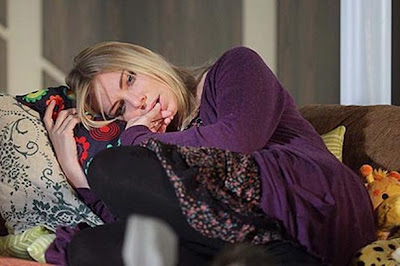 |
| Ronnie from Eastenders |
The Characterization of Bereaved Mothers: Are We Getting It Right? by Angela Smith
Ironically, script submissions are often invited by TV and film producers with the emphasis on creating strong female characters. However, soap writers seem all too eager to completely and utterly smash these women down to the point of no return. It’s one thing to cleverly show different sides to their personality, but to completely destroy a useful and inspirational character is unnecessary and sadistic.
 |
| Yerma (1999) |
Yerma: The Pain, Heartbreak and Destruction of Infertility and Patriarchy by Leigh Kolb
Yerma’s words about the deep, miserable feelings surrounding infertility are poignant and heartbreakingly accurate. While much is going on in this film worth discussing–the patriarchal culture that arranges marriages and ties a woman’s worth solely to her ability to have children, obviously, and the immediate blame of the woman when a couple can’t conceive–Yerma’s struggle with infertility is one of the most accurate portrayals of that grief that I’ve ever seen.
 |
| A mother makes a difference. |
How a Flatliners Ad During a Movie Showing Made This Woman Walk Out by Pandora Diane MacMillan
I think this was one of the very first film showings that included a special, movie-only commercial meant to promote a new line of Levi’s jeans. The new line was apparently to be called “Flatliners,” yes, a promotional tie-in with that film, with the association that Flatliner Jeans would make the wearer look slim and “flat.” They also apparently thought it would be cute, hip, and hilarious to display the young male wearer of said jeans as DEAD and FLATLINED and to have someone jumpstart the person’s heart with defibrillators(!).
 |
| Days of Our Lives |
Days of Our Lives: Punishing Nicole’s Fetus by Janyce Denise Glasper
Days of Our Lives writers appeared to be Nicole’s biggest adversaries, judgmentally weaving a “how can we top that last terrible heartbreak for this evil woman who committed paltry crimes at best?” Horrific enough that she went through the tragedy of losing a baby once, but to push her into repeating that trauma in an astonishingly grotesque manner seemed much uncalled for and heinous. They made an example of out this Mary Magdalene pariah, promising miraculous motherhood twice and ripping it from her grasp, a condemnation for her tumultuously stormy past.
 |
| Away We Go (2009) |
Away We Go: Infertility and the Indie Film by LD Anderson
I found Tom and Munch to be hurtful caricatures of infertile couples. I understand that the desire to have children of one’s own loins is very natural, and that the inability to do so can be extremely painful. However, I would dare say that society’s insistence on considering adoption second-rate, and its complete failure to recognize childless couples as families, makes it far more painful than it has to be.
 |
| Pixar’s Up (2009) |
When Life Gives You Infertility, Make Your House Fly: Found Family in Up by Talia Liben Yarmush
I can tell you that the first theme, miscarriage, is shown in only seconds, and it is a scene that will remain with you throughout the entire film. In thirty seconds, this animated family film is able to portray the loss in such a visceral way that even if you have never had an experience like it, you will be brought to tears. And I can tell you that the second theme, living childfree, is complicated and filled with mixed emotions.
 |
| “You are not alone in this.” |
Empty Wombs and Blank Screens: The Absence of Infertility and Pregnancy Loss in Media by Leigh Kolb
I try to rationalize why portrayals of infertility and pregnancy loss are so rare. Where is the action, a scriptwriting professor scribbled in my margins when I had too much internal dialogue or a conversation between female friends. There’s not much action in infertility. The struggle is literally and figuratively inside.
But then I realize I’m just making excuses for Hollywood. Infertility and pregnancy loss are rich with story-line possibilities. The very nature of these tragedies is in lock-step with literary conflicts and archetypes. (Wo)man vs. self? Check. (Wo)man vs. nature? Check. Journey/quest? Check. Unhealable wound? Check.
 |
| Game of Thrones |
The Mother of Dragons Is Taking Down the Patriarchy in Game of Thrones: Daenerys, Feminism and Motherhood by Megan Kearns
Reproduction & Abortion Week: Mother and Child by Candice Frederick (first published on April 25, 2012)
What to Expect When You’re Expecting: Unexpected Gem by Robin Hitchcock (first published on October 12, 2012)